Frequently Asked Questions
About Sylvia Engdahl and Her Books
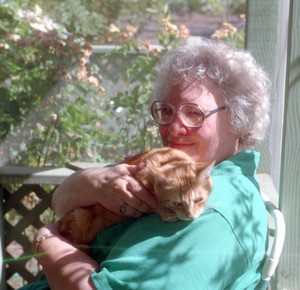
General questions about my books
Questions about my personal life
Questions about Enchantress from the Stars
Questions about The Far Side of Evil
Questions about Journey Between Worlds
Questions about the Children of the Star trilogy
Questions about Stewards of the Flame
Questions about Promise of the Flame
Questions about the Captain of Estel trilogy
Questions about The Planet-Girded Suns
Advice for aspiring writers
Why I Write About the Future
This was originally a guest post at the blog "Mythical Books," but I don't know how long it wi[[ stay online there, and in any case, since it's one of the most frequent questions I'm asked, the answer needs to be in an accessible place.People often ask why I chose to write science fiction. First of all, let me say that although my novels are set on future or hypothetical worlds and therefore have to be called science fiction, they are not typical of that genre and generally appeal more to people who read little if any other science fiction than to avid sci-fi fans (although there are exceptions, of course; some science fiction enthusiasts love them). As Iíve often said, I hate the ďgenreĒ system, which labels books in such a way that they will never be discovered by readers who donít look at listings for genres they donít usually enjoy. Formula fiction is easily categorized by genre, but when a writer directs a book to a wider audience than people who are seeking stories that fit a particular formula and who dislike departures from it, a forced genre classification does nothing but harm.
My novels donít fit the usual requirements of the science fiction genre. They are not action/adventure stories. Thereís nothing weird in them; they are not ďfar outĒ enough to suit the tastes of readers with an extensive background in sci-fi. On the other hand, there is little if any science. While I donít violate known scientific fact with respect to near-future settings, when it comes to the distant future I use familiar ideas, such as faster-than-light travel, without offering a made-up explanation for it that is no more factual than the simple assumption that interstellar travel by means presently unknown to us will someday exist. I describe extraterrestrials as very much like us, not because I donít realize that they are probably not at all like us, but because anything I might imagine would be no closer to reality than portraying them in a way that encourages reader identification with the characters. My aim is to express views of life that I believe are timeless and universal apart from the specific setting of a story, and since I am not writing fantasy, I feel that artificial, fantastic details are distracting.
So if I donít want to conform the conventions of the science fiction genre, why do I write about the future? For two reasons: first, the idea of a universe filled with countless inhabited worlds (an idea that was believed by almost all educated people in the 18th and 19th centuries, long before its recent revival by science) has always fascinated me. And second, because I believe that how people in our era think about the future is important. The expansion of human civilization into space is, my opinion, vital to our future survival; this has been one of my deepest convictions for nearly sixty years. I have little sympathy either with doomsayers who maintain that we are headed for catastrophe or with the notion that Earth is the only place of value and that it can remain isolated from the rest of the universe. Furthermore, I feel that itís harmful to view extraterrestrials either as evil aliens likely to invade our planet or as ďgods from outer spaceĒ who will arrive to give us all the answers and save us from ourselves. None of these views foster constructive efforts to solve our worldís problems, and they lead to a negative conception of our place in the universe that distorts the outlook of young generations. And so I attempt in my novels to combat them.
Above all, I want readers to look toward the future with hope, in the belief that however difficult our problems, and however slowly our species evolves, humankind will continue to move forward. Our world is one small part of a vast, wonder-filled universe that we will sooner or later encounter. People need to think of it in that light.
General Information About My Books
How many books have you published?Twenty, not counting the nonfiction anthologies I complied as a freelance editor, plus three omnibus editions. Twelve were originally published in hardcover by Atheneum between 1970 and 1981 -- six YA science fiction novels; a YA nonfiction book, The Planet-Girded Suns, that I have recently updated and reissued as an adult book; two YA science fiction anthologies that I edited; two co-authored nonfiction books for teens, now outdated; and one picture book. The novels have all been reissued in both hardcover and paperback updated editions by different publishers in the 21st century, and are now available in ebook editions. In addition I have written five adult novels and three collections of essays.
There are now separate FAQs for all my novels and I urge you to read them, as they contain a lot of information I'd like my readers to know. Some of it used to be in this general FAQ but in June 2019 was moved to the separate ones.
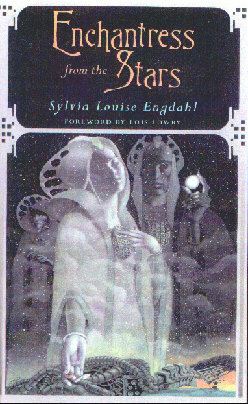 Do you do book signings, personal appearances, or school visits?
Do you do book signings, personal appearances, or school visits?
No, due to my physical limitations I am unable to go out, and because of hearing difficulty I can no longer do phone interviews. However, I'm always happy to answer questions from readers or school classes by email.
Which is your most successful novel?
The best-known is my Young Adult book, Enchantress from the Stars (1970), which was a 1971 Newbery Honor Book. The original edition was sold to more libraries than my others because it's interesting to younger readers as well as to teens.
,Is there a sequel to Enchantress from the Stars?
The Far Side of Evil is often called a sequel because it has the same heroine, but she is older than in the earlier book (a college graduate) and it is a darker story that's less suitable for readers below high school age. I don't want it to be considered a sequel, since it's very different and is completely independent from Enchantress.. Older teens and adults can read them in either order.
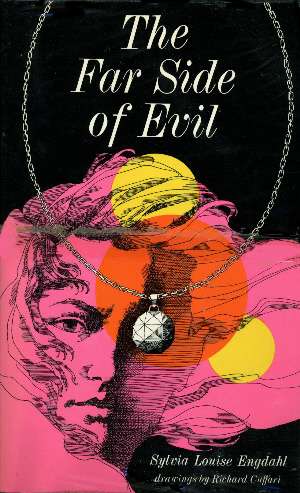
Do any of the characters besides Elana appear in both books?
No. She visits a different world, accompanied by different people. It's a
world very much like Earth was in the 1950s before the launching of Sputnik.
Many science fiction fans have never heard of your novels. Why is
that?
All except Stewards of the Flame, Promise of the Flame,
Defender of the Flame, Herald of the Flame and Envoy of the Flame
were originally issued as Young Adult books -- even though, except
for Enchantress from the Stars, they aren't interesting to most
readers below their mid-teens. This means they weren't marketed in the same
way as other science fiction; in the publishing business, YA books are
issued through the children's editorial and sales departments, which are
entirely separate from those that handle adult novels. Until recently their
hardcover editions were rarely carried by stores, and only the review media
read by youth librarians generally saw them. Yet the new editions of my YA
books, even the adult omnibus of Children of the Star, weren't
often reviewed because few media will review reprints.
If these novels aren't interesting to younger teen readers, why
were their jackets marked "ages 10-14" or "12 up" -- a marking still visible
on library copies of the original editions? Don't advanced readers usually
seek books with a suggested age level higher than their own age?
The original publisher felt the books would sell better that way than
with a more realistic marking. An author has no control whatsoever over
what's said on the jacket or in advertising. Personally, I think these
labels, and the resulting placement of the books in library children's
rooms, kept them out of the hands of the people most apt to like them.
Beyond the Tomorrow Mountains and The Doors of the Universe in
particular seem boring to readers who are too young to understand the issues
with which they deal, and children sometimes find The Far Side of Evil
disturbing.
Since mature teenagers generally read adult SF instead of
children's books, why didn't you publish your trilogy as adult fiction in
the first place?
Enchantress from the Stars does appeal to children although it has
no child characters, and it won honors in the children's literature field.
So that was the field in which I had sufficient reputation to sell the
later books. Moreover, I didn't want to address my work exclusively to the
"in-group" of SF fans; I wanted to reach readers who don't have background
in the SF genre. That meant making the stories intelligible to reviewers not
familiar with the ideas and conventions on which genre-oriented SF relies, and
yet publishers won't issue books set in the distant future as mainstream.
If most of your books are for older teens, why did you choose to become
a children's author?
I didn't! And it is frustrating to me to be called a children's author, since I don't
consider older teens "children." I had one idea for a book that appeals to children,
and that couldn't have been written in any other form -- and of course I'm happy that it
became a Newbery Honor Book, though that meant it has been given to a great
many children too young to understand its themes (even Enchantress was originally
intended for teens). But because it did, I was "branded" as a children's author, which I
never wanted to be, and it has kept the rest of my work from reaching more than a fraction
of its intended audience.
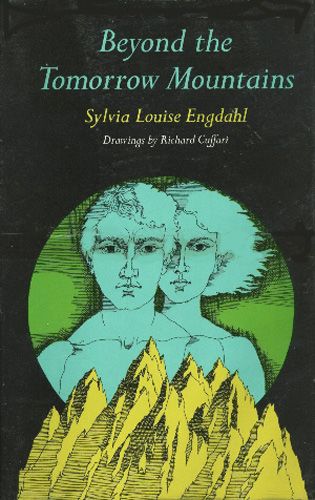 The structure of the publishing business was responsible for this; at the time my
books were first published, novels for teens were
edited and marketed by children's departments and sold for the children's collections
of libraries. Therefore, publishers promoted them as children's books although it was
acknowledged that many such as mine were only for "special" readers -- in other words,
the minority of gifted children who read at an adult level. This is less true today, when much
more mature books than in the past are being issued as Young Adult and sold directly to
teens rather than just to librarians. Their authors are not labeled "children's authors" since it's
well known that most teens don't want to read books intended for children.
The structure of the publishing business was responsible for this; at the time my
books were first published, novels for teens were
edited and marketed by children's departments and sold for the children's collections
of libraries. Therefore, publishers promoted them as children's books although it was
acknowledged that many such as mine were only for "special" readers -- in other words,
the minority of gifted children who read at an adult level. This is less true today, when much
more mature books than in the past are being issued as Young Adult and sold directly to
teens rather than just to librarians. Their authors are not labeled "children's authors" since it's
well known that most teens don't want to read books intended for children.
Many Young Adult science fiction novels are reprinted in mass-market SF paperback lines. Why weren't yours?
For one thing, it was felt that they weren't sufficiently action-oriented to attract large paperback audiences -- I think that in the 70s I was the only author of YA science fiction whose books were successful in hardcover, yet weren't sold for mass-market reprint. Later, the publishing field changed somewhat; in 2000 the omnibus edition of the trilogy was issued in a trade softcover line as adult SF, and during the next decade the rack-size trade paperback editions of Enchantress from the Stars, The Far Side of Evil and Journey Between Worlds were supposedly marketed to both teen and adult sections of bookstores.
However, there is also another reason. Mass-market paperback lines are strictly organized by genre, and my books don't appeal to the majority of science fiction fans, who generally have a lot of background in that field -- whereas they do appeal to readers who rarely if ever choose science fiction and wouldn't be looking at the SF shelves of bookstores. This makes them virtually unmarketable in the mass-market format.
Weren't there some earlier trade paperback editions?
Not of the trilogy. Enchantress from the Stars, The Far Side of Evil and This Star Shall Abide appeared in children's paperback form, and Enchantress had a Troll Book Club edition distributed in schools. There were also 1989 Collier Books paperback editions of Enchantress and Far Side; these did reach the SF sections of some chain stores, although their covers (unfortunately, in my opinion) were designed to attract a younger audience.
Why were your books suddenly republished after being out of print so long?
In the case of Children of the Star it was because the Internet and other new technologies have made it economical for small presses to offer books that don't have the huge mass-market appeal major publishers now require. In the case of my Young Adult books, it was largely due to the phenomenal success of Harry Potter, which created a demand for hardcover fantasy and science fiction for teens and is causing bookstores to carry more of it than in the past. The original hardcover editions of my books were sold almost exclusively to libraries, whereas the new ones were available in retail outlets.
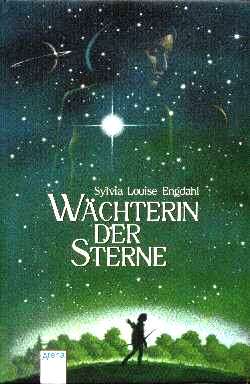
German edition of Enchantress from the Stars
Enchantress from the Stars and The Far Side of Evil were published by Gollancz in England during the 1970s, as was This Star Shall Abide under the title Heritage of the Star (which also had a UK paperback edition). Enchantress appeared in Japanese at that time. German, Spanish, Portuguese, Finnish, Chinese, Hebrew, and Korean editions of Enchantress were published after the 2001 Walker edition appeared.
Why did the British edition of This Star Shall Abide have a different title than the American edition?
Because Gollancz didn't happen to like the original title. It is quite common for the U.S. and U.K. editions of the same book to have different titles (even the first Harry Potter book!) This is very confusing, especially now that books can be obtained so easily via the Internet by readers all over the world. But title decisions are made by publishers; authors' preferences are not always accepted.
Why did you drop your middle name from some reprint editions of your books?
Originally, I used my full name, Sylvia Louise Engdahl, on my novels. But my British publisher felt that a double feminine name might make them less attractive to male SF buyers, and on reflection I decided that this is probably true. Furthermore, my full name is associated with my reputation as a "children's author," which I have tried to overcome in the case of books other than Enchantress from the Stars because I don't consider older teenage readers "children," and because recently I have been writing adult novels. Therefore I have not used it on the paperback or ebook editions of my books.
 What awards have you won for your writing?
What awards have you won for your writing?
Besides being a 1971 Newbery Honor Book, Enchantress from the Stars later won the Children's Literature Association's 1990 Phoenix Award, which is given each year "from the perspective of time" to a children's book first published 20 years prior to the award's presentation, and it was a finalist for the 2002 Book Sense Book of the Year in the Rediscovery category.
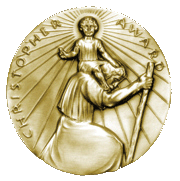
This Star Shall Abide won a 1973 Christopher Award for "affirmation of the highest values of the human spirit."
My adult novel Stewards of the Flame won a bronze medal in the 2008 Independent Publisher (IPPY) Book Awards.
Where do you get your ideas?
My novels grew out of my lifelong interest in space and my strong desire
to convey how important our viewpoint toward space is to the future. As to
the ideas for the central events in the stories, I wish I knew! They came
to me than ten years before I wrote the books, and I didn't have any more
until recently -- although, of course, I had lots of ideas about issues I wished
I could express in the form of fiction.
Have you ever published any short stories?
No, I've never had ideas appropriate for short stories -- mine required
complicated backgrounds. I co-authored two fairly long stories that appear
in my anthologies: "The Beckoning Trail," co-authored with my friend Rick Roberson,
in Universe Ahead (1975) and "Timescape," co-authored with my mother
Mildred Butler, in Anywhere, Anywhen (1976). These were based largely on the
ideas of the co-authors, not mine. They are now available in the
expanded ebook edition of Anywhere,
Anywhen, along with one other story, "Tranquility," written long ago but never
published in print. In addition "The Beckoning Trail" appears as the Prologue to
my novel Envoy of the Flame, which is a continuation of that story.
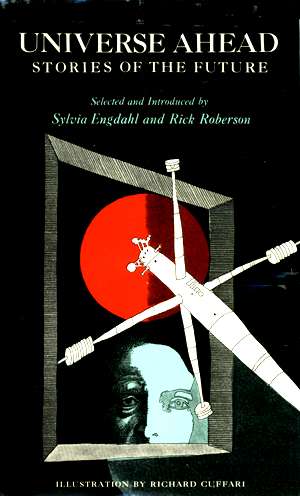 Will the other short story anthology, Universe Ahead, ever be
issued as an ebook?
Will the other short story anthology, Universe Ahead, ever be
issued as an ebook?
No. All the stories in it except those by me and by Rick Roberson, which are included in the ebook edition of Anywhere, Anywhen, were reprints of of fiction by other authors from science fiction books or magazines .. I no longer have any rights to them, as the permission fees paid covered only the original Atheneum edition.
Why didn't you publish any novels between 1981 and 2007?
There have been only short periods in my life during which I could create stories at all. Thinking up the action in fiction has always been very hard for me -- I've had plenty of themes, settings and characters in mind, but in a story something has to happen! It's the happenings that I can't often come up with. Strange as this seems to my friends (and for that matter, to strangers) it's something I can't control. This is not "writer's block." I never have any trouble expressing thoughts in words. But my thoughts don't normally take the form of eventful narrative. Actually, the mystery is why I was able to write fiction during the late 60s and early 70s; before and for many years thereafter, my talents were more analytical than imaginative.
To be sure, part of the trouble is that unlike most science fiction authors, I am not interested in imagining "what if" situations that don't match my actual convictions about the universe and about future human evolution (though of course, I often present ideas metaphorically rather than literally). What inspires me to write is the expression of my views on these subjects through the experiences of fictional characters. I could not, for example, write about an advanced form of life that solved its problems without expanding beyond its home world, because I believe that space colonization is the only solution to the problems that arise at the stage of evolution where it becomes possible. And I couldn't write about the Service of my Elana books intervening in the affairs of a world that could survive s on its own, because I believe truly advanced beings wouldn't do that. So I'm limited by more than lack of imagination; any story situation I use has to fit my opinions.
In 2005 I was, to my great surprise, "struck by lightning" with the idea for a story again and wrote my adult novel, Stewards of the Flame, which I published in 2007. The ideas for the four later "Flame" novels came to me one at a time, without my having any prior expectation of continuing the story. These novels are not suitable for children or young teens and are intended for an entirely different market from the one in which I have been best known.
For a more formal and detailed explanation of why I haven't written more novels, see my essay in What It Takes to Write a Novel, originally published online by Critique Magazine and now available at this website.

Original cover of Stewards of the Flame
Because publishers of adult fiction demand that it be strictly categorized by genre, and these novels donít fit genre requirements. Since they're set in the future on another planet, they're considered science fiction -- yet like my YA novels, they appeal more to general audiences than to those with extensive science fiction background. This means they're not suitable for adult SF lines, and in any case I want them to reach other readers, too. At my age, I feel itís unlikely that marketing criteria will change during my lifetime, so the only way get the story into the hands of adult readers was to publish on my own.
But isn't it unprofessional for an author to pay for a book's publication?
Not anymore. I did not pay anything other than small registration fees (and fees for licenses to use the cover art). I have desktop publishing and professional copyediting experience, so although the books are printed and distributed by Amazon.com's print-on-demand subsidiary, I did the design and typesetting personally on my own computer, and even designed the covers. It is not unprofessional to pay for these things individually, however, and authors who lack the skills are strongly advised to do so. This is different from "vanity press" publishing where an author pays a publishing company to issue the book as if it were traditionally published.
During the past few years self-publishing, now known as indie publishing, has become common and respectable. Now that authors can easily publish ebooks at no cost and get them distributed to major retailers, independent publishing is thriving, and many believe that in the future it will dominate the publishing field. I have personally issued all the YA books to which the rights have reverted to me, as well as my indie novels, in both ebook and paperback editions, as many other professional authors are doing with their backlists.
What is Ad Stellae Books and why is it listed as the publisher of your recent books?
Ad Stellae Books is my personal imprint, not a publishing company. I preferred having my own to using ISBNs belonging to print-on-demand companies, which mark a book as self-published when it is listed in a catalogs even though not on the book itself. The time may be coming when there will be no disadvantage to this, but it's not quite here yet. (For awhile it was not possible for indie books using special ISBNs to be listed in the distributor's catalog from which libraries buy, so in order to make mine available to libraries I republished some of them under the printer's ISBN. This means that although "Ad Stellae Books" appears on their title pages, it has not always been listed as the publisher in catalogs. However, all copies printed in 2022 or later have Ad Stellae ISBNs. )
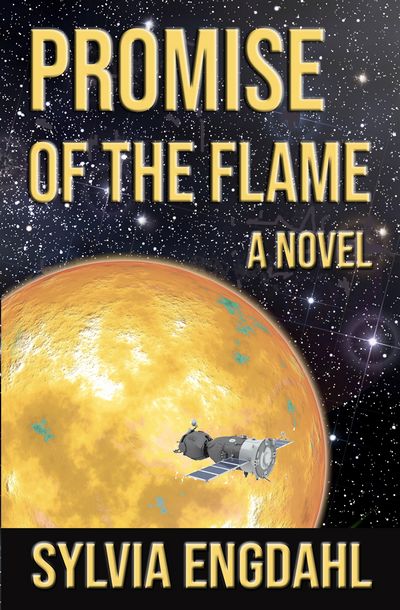
Because Amazon demands the exclusive right to distribute them if they are made available for free borrowing by subscribers to Kindle Unlimited. Also, Amazon promotes ebooks exclusively available there, so that they are seen by many people who would not otherwise know they exist. I don't approve of this policy since I don't believe any retailer should have the sole right to sell a book, but I felt forced to accept it in order to get new readers. For a while more people read these novels through Kindle Unlimited (under which authors are paid by the number of pages read) than were buying them from other retailers. However, not enough did so to justify limiting their distribution..
Why aren't your books in more public libraries?
In the case of my YA novels, it's because their original copies have worn out or been lost and except for
Enchantress from the Stars, libraries prefer to buy recent books rather than replace older ones. With my adult novels, it's because most have a policy against buying books that are not reviewed by the major review media, and there is no way to get a review in any of the major media without submitting galleys months in advance of publication (and even then, they rarely review self-published books). Also, most libraries will not buy books unavailable from their regular distributors. I sent many review copies of Stewards of the Flame to public libraries, asking them to consider the copy a donation even if they chose not to buy more, but only a few put it into their collections. I suspect they do not have staff available to look at unsolicited books, even if by authors whose earlier books they already have.
Books put in donation barrels are generally sold at used book sales.
There is one way to get a book into a library, however, and that's for a local patron to submit a request for it. If anyone reading this will do so I will be deeply grateful! Also, the Smashwords ebook editions of my books have recently become available free to libraries through OverDrive, but since Smashwords offers thousands of titles, libraries don't realize mine can be obtained there. I would greatly appreciate help in making them aware of it. Some people think that authors aren't eager for their books to be in libraries for fear that it would cut into sales of personal copies. That isn't true. Being in libraries is the best publicity a book can have. The more people read a book, the better known it becomes, whereas if nobody has a chance to see it, few copies are sold to people not already familiar with the author's work.
Why do you write only science fiction?
See the article above. Apart from wanting to devote my time to the issue of humankind's future, I've never had any ideas for stories set in the present or past. It's the thought of what may happen in the future--o elsewhere in the universe--that inspires mr
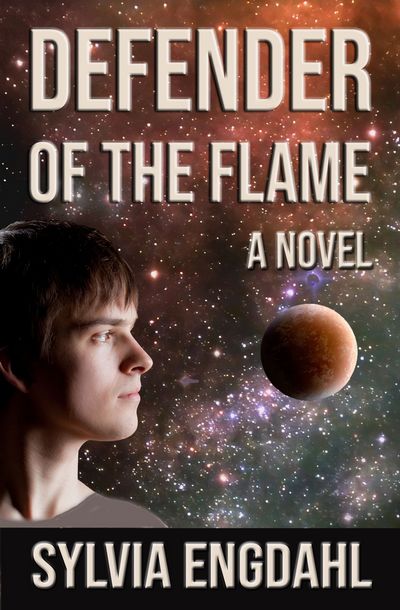
Until comparatively recently I rarely expressed myself publicly on any topic except space -- and this was deliberate, since I believe that developing a permanent presence in space is the most important issue humankind needs to deal with. It is a nonpartisan issue, and I haven't wanted to let my opinions on other subjects distract people from what I say about it, or to drive half my potential readers away because my political views don't match theirs.
However, I had been writing about space for more than 40 years and had reached the age where I'm increasingly aware that I don't have a great many years left to put off presenting ideas about other issues I care about. So In the Flame duologies I did express some controversial views, and I focused on future human powers such as ESP because I think these are advanced capabilities that will be developed as humankind continues to evolve. I believe they will lead to greater understanding among people- -and ultimately to understanding between ourselves and species that have evolved on other worlds.
Moreover, space colonization is a premise of those duologies in a larger sense than the plot preventing them from being set on Earth. To turn to "inner space" before making sufficient effort to spread into outer space, as some people advocate, would be self-defeating, since colonization of space is necessary to our long-term survival. Thus at the stage where advanced psi powers become widespread, there will necessarily be many colonized worlds; the mere assumption that the two developments are inseparable is in line with what I've been saying all along.
Do you intend to write more novels in the future?
I would if I got a story idea, but that is unlikely. Story ideas have come rarely to me and taken many years to develop in my unconscious mind. Since I'm now 90, I doubt if there's enough time left for another one to grow.
Have you ever considered writing books for younger children?
That requires a gift I don't have. Besides, I don't know children well enough to write about them -- I've never had any contact with them, apart from working as a summer camp counselor when I was in college and one year of teaching at which I was not very successful.
Some of your novels appeared on feminist reading lists in the seventies. Did you aim for that?
I never thought about it. Enchantress from the Stars was the first science fiction novel with a female protagonist to be issued as YA (a classification that depends not on the age of the characters, but on which department of the publisher edits and markets the book). Feminists liked her, especially in the other novel where she appears, The Far Side of Evil, in which she assumes authority over a male colleague. But I'm not a women's rights activist; I wrote about a young woman because I found her easy to identify with, and I assumed that in a culture as advanced as I was portraying, men and women would naturally be equal. (Then with the trilogy, where I wrote from a male viewpoint, feminists complained that his world's society was sexist -- which indeed it was, because I was trying to show that it had reverted to a backward level socially as well as technologically.)
What has been your most gratifying response from your readers?
For many years I said that apart from the awards I'd received, I was most pleased by the remark of an adult reader of Journey Between Worlds who told me it convinced her that the space program is worthwhile.
But in 1997, within two weeks of the opening of this Web site, that changed. Nothing in my experience has ever pleased (or astonished) me more than the discovery of how many adults remember my books from their childhood or teen years and feel that they were influenced by them. In my pre-Internet years, I received praise from reviewers and librarians and sometimes got mail from children assigned to write letters to authors in school, but only on rare occasions did I hear from readers who reacted personally to the novels. I have been deeply touched to learn they've had lasting impact.
Is there anything you regret about your books, that you wish you'd done differently?
I have been sorry that I connected The Far Side of Evil to Enchantress from the Stars instead of using another protagonist. The two novels, despite being set in the same SF "universe," are otherwise independent and appeal to different audiences, although many older teens and adults like both. The younger readers of Enchantress are often disappointed that the second story isn't a continuation of the first, or are depressed by the subjects with which it deals. Of course, when I wrote it, I had no idea that Enchantress would become a Newbery Honor Book and be given to as many pre-teen readers as it was, so I didn't foresee that problem. Nor did I realize that few of the older teen readers for whom The Far Side of Evil was intended would discover a book that was labeled as a "sequel" to a children's book (a label I now want to avoid).
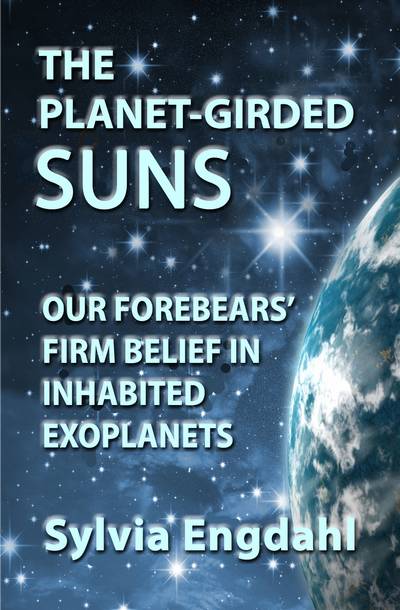 What nonfiction have you written?
What nonfiction have you written?
The Planet-Girded Suns: Man's View of Other Solar Systems (1974) is the history of opinions about extrasolar life -- which, contrary to common belief, was assumed to exist throughout the 18th and 19th centuries. I updated and reissued it in 2012 with a dfferent subtitlen, and it's available in both ebook and paperback editions with the still newer subtitle Our Forebears' Firm Belief in Inhabited Exoplanets.
The Subnuclear Zoo: New Discoveries in High Energy Physics (1977) and Tool for Tomorrow: New Knowledge About Genes (1979) were co-authored with Rick Roberson, who at that time was a science student with more training in those subjects than I'd had. These books were meant for 6th to 8th graders but turned out to be hard for most of them, yet too oversimplified for high school. The information in them is by now outdated.
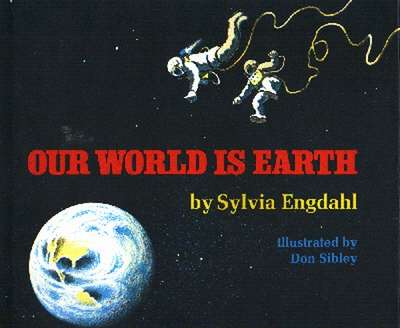 Our World Is Earth (1979) is a picture book for young children.
Ironically, though my books have usually been called too difficult for their
intended age level, some reviewers thought this one was too easy -- they
assumed it was a "science book" for primary grades whereas actually I meant
it to be read aloud to preschoolers.
Our World Is Earth (1979) is a picture book for young children.
Ironically, though my books have usually been called too difficult for their
intended age level, some reviewers thought this one was too easy -- they
assumed it was a "science book" for primary grades whereas actually I meant
it to be read aloud to preschoolers.
I've also written many essays, now collected in three ebooks: Reflections on Enchantress from the Stars and Other Essays, From This Green Earth: Essays on Looking Outward, and The Future of Being Human and Other Essays.
Between 2005 and 2014 I compiled 59 nonfiction anthologies for Greenhaven Press as a freelance editor. These appear under my name in book catalogs, but I merely chose the material for them and wrote the introductions. They do not reveal my opinions on their subjects, as the aim of the series was to present conflicting views impartially.
Why have you made your essay collections permafree?
Because I want them to be read and with the huge number of Kindle books available on Amazon (over 7 million as of July 2020, with an estimated 7500 new ones published per day) people looking for books to read will never see them unless they are on the "free" list. These books don't fit into neatly defined categories that will turn them up in searches. For example, a search for "space" will bring up countless books on technical aspects of space flight plus even more about UFOs. To be discovered, a book not in a narrow category must be found through a search by author unless it is a bestseller. Of course, the same problem exists with my novels, especially my adult science fiction novels -- so I hope that readers who like the essays will search by my name for other books I've written.
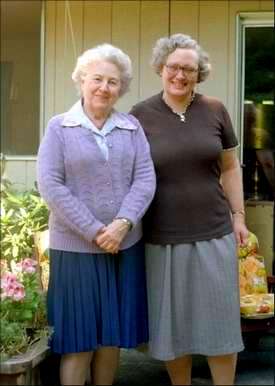 Do you have a family?
Do you have a family?
 After that, from 1957 to 1967, I was a programmer and then computer
systems specialist for the
After that, from 1957 to 1967, I was a programmer and then computer
systems specialist for the 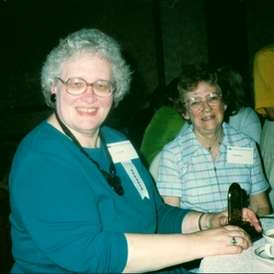 Despite my lifelong interest in space, I have never been a "science
fiction fan" in the sense the term is generally used, because I don't
personally care for fiction that goes out of its way to portray lifeforms
and civilizations far removed from humanity as we know it, or that's in any
sense "weird" -- nor do I often enjoy action stories. Thus I don't have wide
background in the SF/fantasy genre and have had no connection with the
subculture that surrounds it -- although this doesn't mean I don't admire
the skill and imagination of authors in that field, especially of those who
have inspired members of the subculture to believe in a spacefaring future
for humankind.
Despite my lifelong interest in space, I have never been a "science
fiction fan" in the sense the term is generally used, because I don't
personally care for fiction that goes out of its way to portray lifeforms
and civilizations far removed from humanity as we know it, or that's in any
sense "weird" -- nor do I often enjoy action stories. Thus I don't have wide
background in the SF/fantasy genre and have had no connection with the
subculture that surrounds it -- although this doesn't mean I don't admire
the skill and imagination of authors in that field, especially of those who
have inspired members of the subculture to believe in a spacefaring future
for humankind.